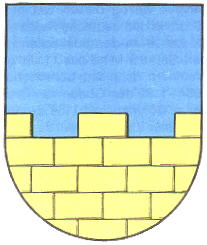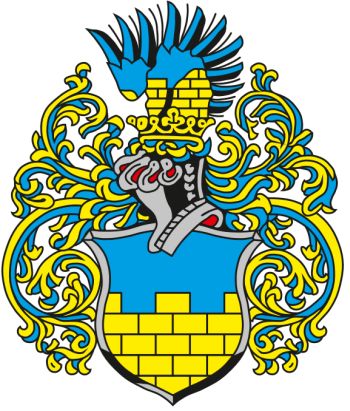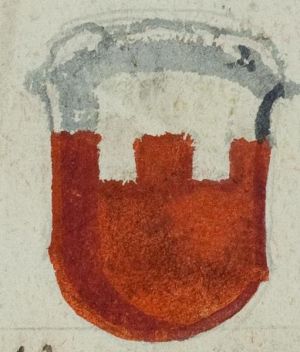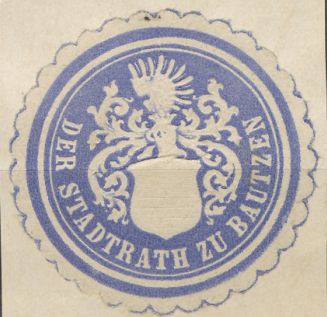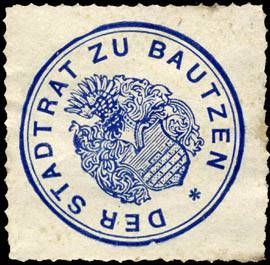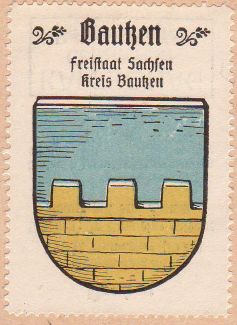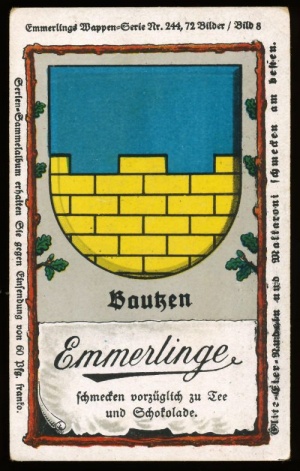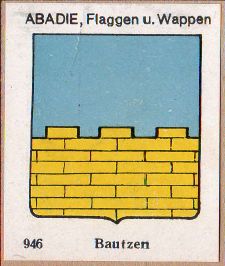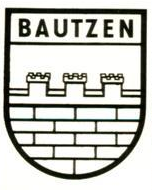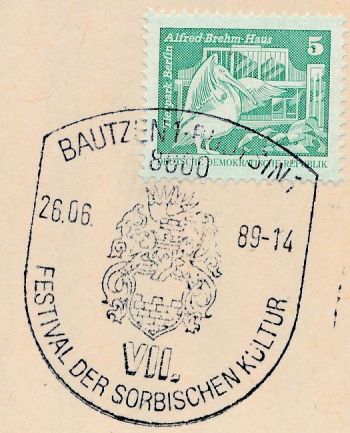Bautzen
This page is part of the German heraldry portal Deutsche Wappensammlung |
Heraldry of the World |
|
German heraldry:
|
Selected collector's items from Germany:
|
BAUTZEN
State : Sachsen
District (Kreis) : Bautzen
Additions : 1922 Seidau; 1950 Teichnitz; 199? Burk, Niederkaina, Basankwitz, Nadelwitz, Auritz, Jenkwitz, Strehla, Oberkaina, Boblitz, Stiebitz, Rattwitz, Bloaschütz, Oberuhna, Niederuhna, Bolbritz, Salzenforst, Schmole, Kleinwelka, Kleinseidau, Neumalsitz, Oehna
The large arms as used by the city:
| German |
Geteilt von Blau über einer dreigezinnten goldenen Mauer mit schwarzen Mauerstrichen. |
| English | No blazon/translation known. Please click here to send your (heraldic !) blazon or translation |
Origin/meaning
The arms were granted on ?
The arms show a golden wall in a blue field. The city often uses the complete armorial bearing, with the shield, crest and mantling, to distinguish the arms of the city from those of the Bautzen distirct. The area around Bautzen has been inhabited for many years and there has been a village since the 7th century. Being a border town, Bautzen was ruled by German, Polish and Bohemian rulers for many centuries, until 1635 when it became part of Sachsen and thus Germany. It is not known when Bautzen received city rights, but already in 1200 it had a clear urban character, and due to the incorporation of some villages in 1250 it became a large city.
The arms are, according to legend, based on the banner of the Lord of Bauzen, Wiprecht of Groitzsch from around 1080. A banner with a similar composition as the arms was mentioned in 1378.
The oldest seal of Bautzen is known from 1283 and shows a city gate, in 1318 with the arms of the Margraves of Brandenburg (eagle) in the gate. When the city became part of Bohemia, the eagle was replaced by the Bohemian lion. In the 15th century the city arms first appeared on the great seal. The seal showed the Bohemian King on a throne, flanked by two small shields; the Bohemian lion and another shield with the wall, including helmet, mantling and crest. From 1484 onwards all seals have shown either the small or the large arms with the wall.
During DDR times the use of crest, helmet and mantling was abandoned, but in the 1990s it was resumed.
| The arms in a 16th century manuscript | |
| Seal from around 1900 |
Seal from around 1900 |
| The arms by Hupp in the Kaffee Hag albums +/- 1925 |
The arms in the Emmerlinge albums |
| The arms in the Abadie albums |
The arms from a 1984 postcard |
| Postal cancellation 1989 |
Literature: Hupp, O: Kaffee Hag albums, 1920s; Benzing et al, 1984


